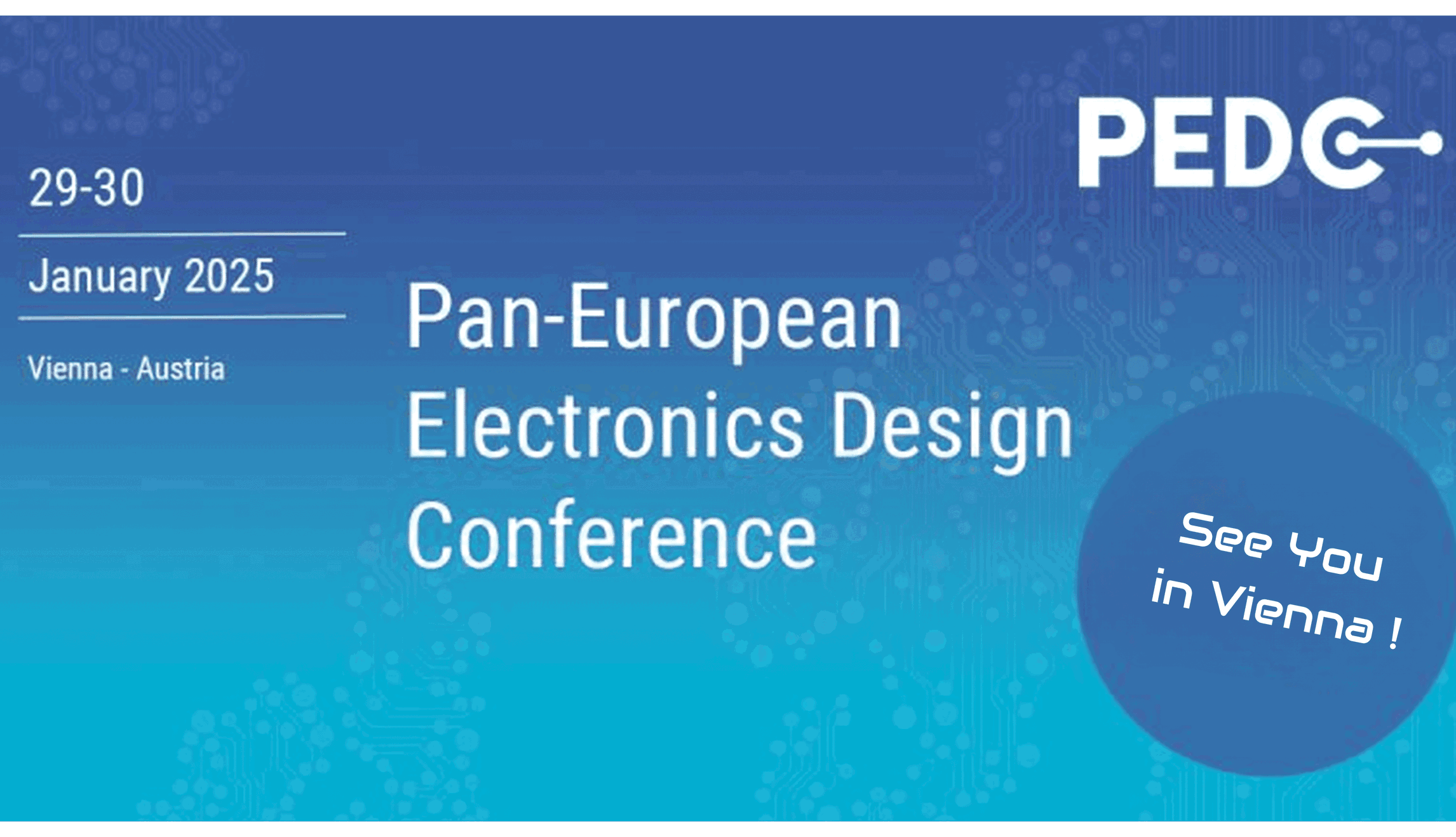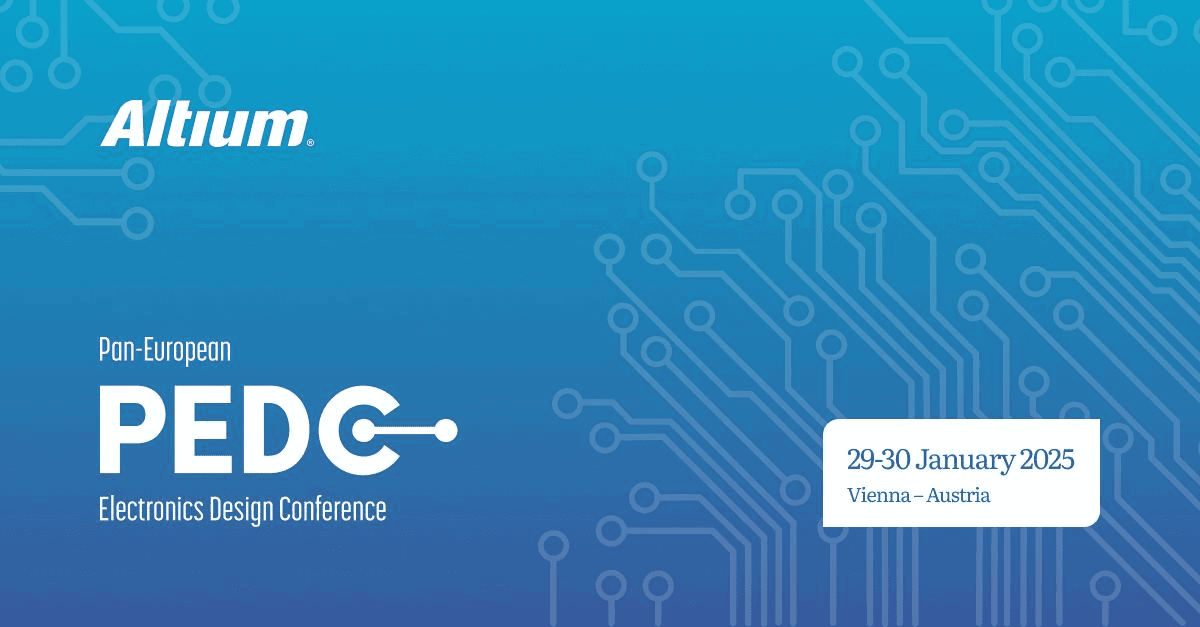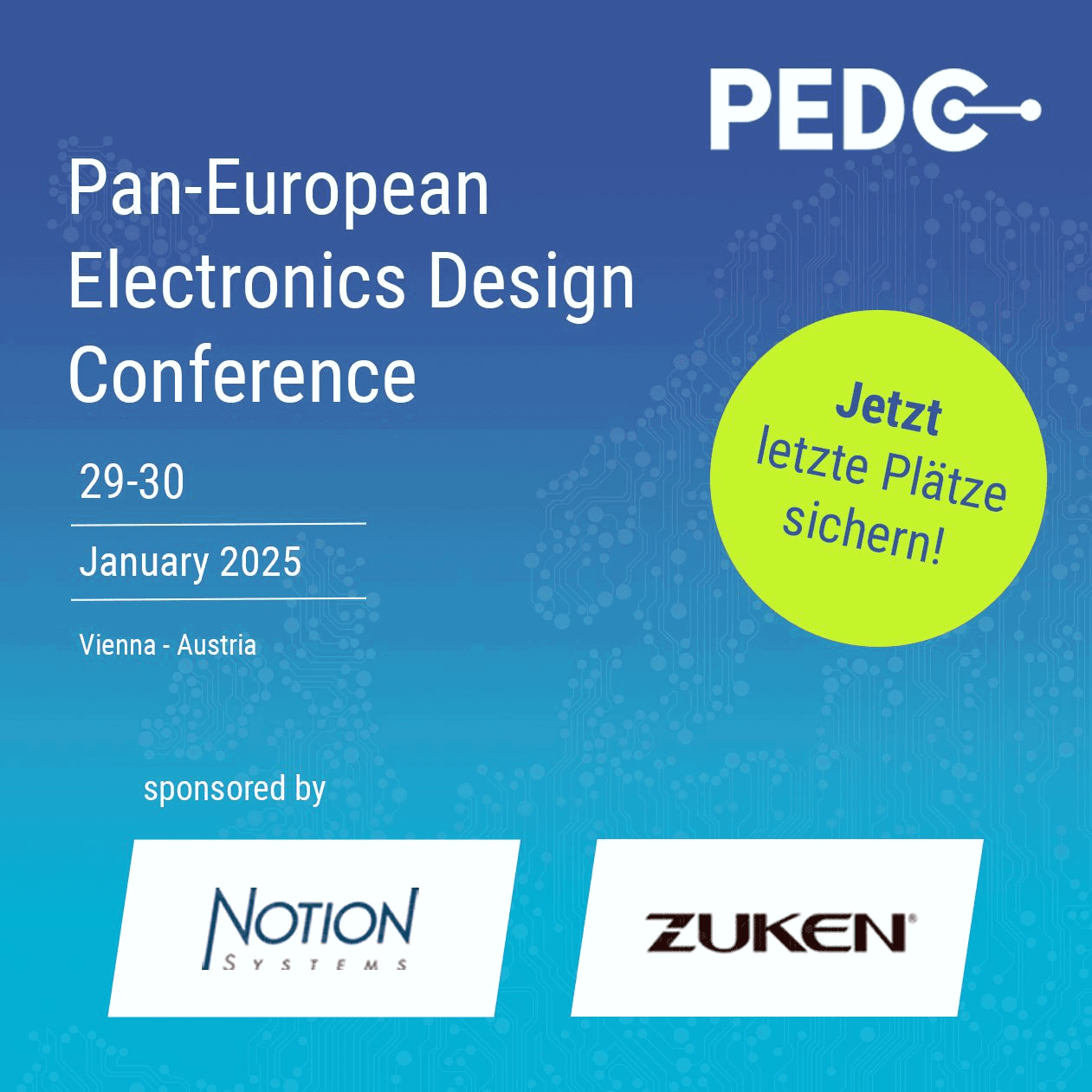Pan-European Electronics Design Conference - IS NOW !

IPC and FED e.V. are calling for submissions from design engineers, researchers, academics, technical experts, and industry leaders for the inaugural Pan-European Electronics Design Conference (PEDC), scheduled for January 29-30, 2025, at the NH Danube City Hotel in Vienna, Austria.
This conference will feature peer-reviewed technical and scientific presentations highlighting the most recent advances in electronic design. Topics include:
- Silicon-to-Systems
- Design for Excellence
- Design Software and Tools
- Design Process and Product Life Cycle
Presenting at PEDC offers participants and their organizations an opportunity to gain visibility and forge connections within the European electrical engineering industry and scientific community.
The conference's language is English.
To see the program click here.
Table of Contents
Experts Showcase
At PEDC-Pan-European Electronics Design Conference, organised by IPC and FED, industry experts will showcase the innovations shaping the future of electronics.
“Game-Changing Future Electronics Using New Passive Components by Combining New Materials With AI.”
on 29 January
Keynote from Prof. Dr. Thomas Ebel, University of Southern Denmark
Discover how advancements in materials like
- polymer aluminium
- electrolytic ceramic capacitors
- wide bandgap semiconductors like GaN and SiC
and machine learning techniques for condition monitoring are driving the next evolution in electronics design.
"A Silicon-to-Systems Approach of an Open-Source Smartwatch Design."
as Keynote
Lukas Henkel, OV Technologies, LLC, Germany
Discover how a wearable device, built around an in-house developed SIP-System-In-Package with embedded silicon-based inductors and ultra-high-density thin film substrates, sets new standards in miniaturisation. Designed with a Linux-based operating system and a focus on sustainability through high repairability, that smartwatch design is a benchmark for knowledge transfer and state-of-the-art electronics design.
"Novel Method to Prove Power Module Design Robustness Using Hyperparameter Tuning With SHERPA”
Wilfried Wessel, Solution Architect, Siemens EDA (Siemens Digital Industries Software), Germany
and PhD student, TU Dublin, Ireland,
will talk about
- how hyperparameter tuning supports automated optimisation of power modules by ensuring equal device temperatures
- improving reliability
- extention of power module lifetime
and valuable insights for professionals interested in
- power module design optimisation
- innovative approaches to enhance performance
- predict manufacturing yield
“Mitigation of Resonances in Metal Shielding Enclosures for Integrated Circuits”
on 29 January,10:30, 2025 as part of the
Silicon-to-Systems and Design Techniques: High Frequency session
María Cuesta Martín, Product Manager EMC Shielding & Thermal Materials, Würth Elektronik Group, Germany
Discover how integrating absorber materials into shielding enclosures can overcome resonance challenges.
Topics:
- Addressing cavity resonances that degrade shielding effectiveness and cause unwanted coupling
- Extending the usability of metal enclosures beyond 5GHz through innovative design strategies
- Characterising absorber materials to optimise their placement and performance for high-frequency applications
„AI-Driven Automation of ECAD Library Footprints“
on 30 January 2025
Savita Ganjigatti, VP Engineering, Sienna ECAD Technologies, India, will speak
The manual creation of electronic component footprints in ECAD libraries has long been a time-consuming and error-prone process.
This presentation introduces AI-driven approach that automates footprint generation,
using the IPC-7351 standards as a foundation.
Topics:
- Efficient Footprint Creation: Automating workflows to save time and reduce errors
- AI Integration: How algorithms analyse component dimensions to generate precise ECAD footprints
- Industry Impact: Case studies and live demonstrations showcasing real-world applications
“Integration of Advanced Wireless Technologies in Compact Consumer Devices With Accurate Positioning Capabilities”
on 30 January 2025 as part of the
Silicon-to-Systems and Design Techniques: Advanced Packaging session
Dr. Malek Chaabane, Brance Manager, habemus! electronic + transfer GmbH, Germany
Discover how advanced wireless technologies and wireless charging are being seamlessly integrated into consumer devices to achieve precise real-time localisation, compact designs, extended autonomy, and top-notch performance.
Topics:
- Designing antennas for optimal radio frequency and positioning performance.
- Enhancing wireless ranges while maintaining cost-efficiency
- Implementing low-power strategies to maximise battery life
- Using advanced manufacturing techniques to ensure quality and reliability
“Software-Based Design Optimisation of an Embedded Power Module”
Janagan Papperi Devarajulu Deenadayalan, Hardware Development Engineer, AT&S Austria Technologie & Systemtechnik AG, Austria
will present his innovative paper
on 30 January 2025
Topics:
- miniaturisation
- embedded component packaging
- software-based design validaiton
- minimise costly prototype iterations
- silicon-to-systems design techniques
- simulaiton tools for high-power embedded modules
“Design for Manufacturing and Reliability of a High-Speed HDI Technology for Space Applications”
on 30 January 2025
Dr. Maarten Cauwe, IMEC, Belgium will speak about
the unique challenges of High-Density Interconnect (HDI) technology
Topics:
- Balancing design capability with reliability for space applications
- Material selection and signal integrity considerations
- Managing thermal and power delivery requirements in high-speed designs
- effective design and manufacturing choices are shaping the future of HDI for aerospace.
“AI-Driven Optimisation of Semiconductor Selection for Enhanced Reliability in Power Electronics Converters."
presented by
Dr Mohammed Ali Khan, Postdoctoral Researcher at the Centre for Industrial Electronics
at the University of Southern Denmark
- How artificial intelligence is transforming semiconductor selection to enhance reliability and performance in power electronics.
- How predictive analytics and machine learning are driving efficiency, improving system robustness, and reducing development costs.
“Using AI for Sustainable Electronics Design”
presented by
Francis D'Souza, Founder, banyan.eco, France
Insights on how AI, combined with sustainability data-sharing initiatives, can support
- Identifying environmental impact hotspots in designs
- Enhancing decision-making with eco-twins
- Ensuring compliance with regulations such as the EU CSRD
- Streamlining processes to focus on innovation
“Robot-Assisted Testing Concept for Electronic Assemblies in Small Batch Sizes Using AI,”
presented by
Dr. Richard Scheicher, Head of Innovation and Production Technology, BMK professional electronics, Germany
How AI and robot-assisted solutions can revolutionise small-batch production
Topics:
- Seamless integration of electronics into housing during box-build assembly
- Key design and process requirements for efficiency and cost-effectiveness
- Digitalisation and traceability to enhance production workflows
“Establishing Design Rules for Laser Depaneling of Printed Circuit Boards”
presented by
Patrick Stockbrügger, Product Manager, LPKF, Germany
Offering interesting insights into the benefits and considerations of transitioning to laser depaneling
Topics:
- Key design guidelines for laser technology, such as contour limitations and channel widths
- Optimising cutting quality based on material thickness and component placement
- Comparing laser depaneling to traditional methods like milling or sawing
- Exploring preparation techniques such as v-groove and pre-milling
“AI-Assisted DfM in THT-Solder Joints"
presented by
Dr.-Ing. Reinhardt Seidel, CEO, DEEPTRONICS GmbH, Germany
Discussing the growing relevance of THT soldering in power electronics applications like e-mobility, telecommunications, and renewable energy.
Learn about how AI-based solutions are helping optimise THT soldering for today's performance requirements.
Topics:
- The impact of design decisions on manufacturing costs and product quality
- Challenges of complex designs and addressing critical solder joints
- Using machine-learning algorithms to evaluate THT solderability from design data
- Improving design and manufacturing processes throughout the PCB life cycle
Related Articles

Pan-European Electronics Design Conference - Abstract Submission
AI Impact On Semiconductor Manufacturing & Electronics Component Design

J.A.M.E.S Partners With The Manufacturing Technology Centre (MTC) To Advance And Expand The Network Of AME

Innovative Breakthroughs In 3D Printed Electronics: Insights From MIT And Beyond
























